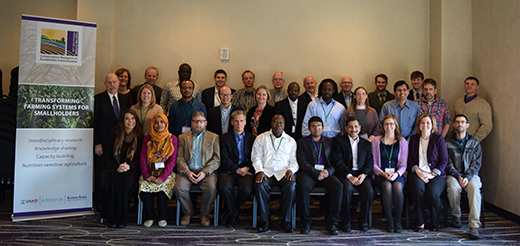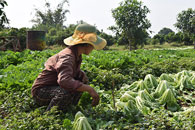Feed the Future lab at Kansas State University awards $6M for work in six countries
Friday, Feb. 19, 2016

Recipients of grants and staff members from Kansas State University's Feed the Future Innovation Lab for Collaborative Research on Sustainable Intensification at the lab's recent annual meeting.| Download this photo.
MANHATTAN — Kansas State University has awarded nearly $6 million to projects that will help improve food security in six countries.
The money is directed through the university's Feed the Future Innovation Lab for Collaborative Research on Sustainable Intensification, which was funded for $50 million in 2014.
Feed the Future innovation labs are part of the U.S. government's global hunger and food security initiative, and are administered by the U.S. Agency for International Development. Twenty-five such labs are hosted by universities across the United States, with four of those labs at Kansas State University.
Feed the Future Innovation Lab for Collaborative Research on Sustainable Intensification staff members initiated a competitive call for proposals in mid-2015. Ninety-eight concept notes were initially received, and 25 applicants were invited to submit full proposals.
Officials for the lab announced the following awards:
• Penn State University, $1 million for a project in Cambodia that will empower women and improve nutrition by promoting their participation in the value chains for horticulture and rice production.
• Texas A&M University, $999,198 for a project in northern Ethiopia that will evaluate the implications of sustainable intensification of crop and livestock production on human nutrition.
• Kansas State University, $999,508 for a project in Bangladesh to increase farm income and nutrition security by improving production within the polders.
• International Livestock Research Institute, $998,001 for a project in Burkina Faso to improve household food production and nutrition and enhance ecosystem services through better integration of crop and livestock production systems.
• Kansas State University, $999,360 for a project in Senegal to address the gap between national production of such protein sources as meat and milk and a growing population.
• Michigan State University, $996,746 for a project in Tanzania to determine best practices for managing fertilizer and soil to improve growing conditions.
Sustainable intensification means producing more food and nutrition on the same land base while protecting the natural resources on which the food system depends.
In addition to the subawards, the Feed the Future Innovation Lab for Collaborative Research on Sustainable Intensification has recently formed two consortia to support its strategic objectives.
The Geospatial and Farming Systems Research Consortium is led by the University of California, Davis and uses satellite images and advanced technology to map land that is targeted for research.
The Appropriate Scale Mechanization Consortium is led by the University of Illinois at Urbana-Champaign and is identifying the appropriate farming tools for smallholder farmers in the target countries.
For more information about the lab and its partnerships with other universities, visit k-state.edu/siil.

